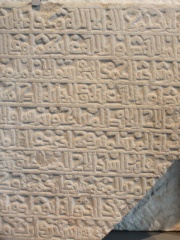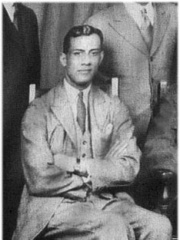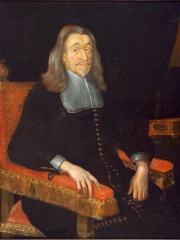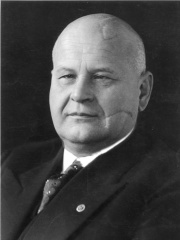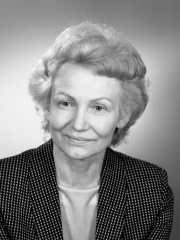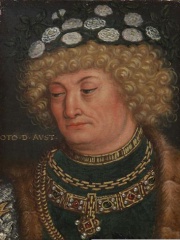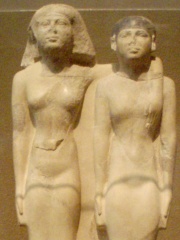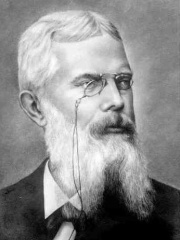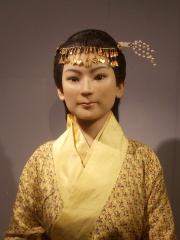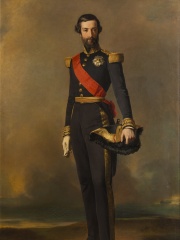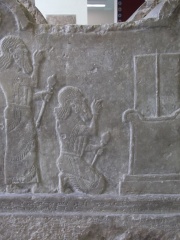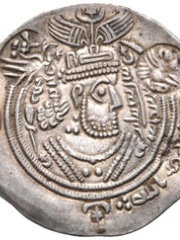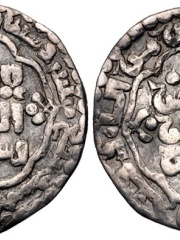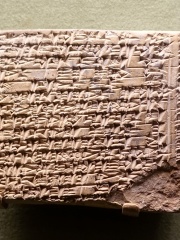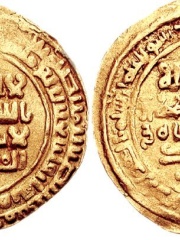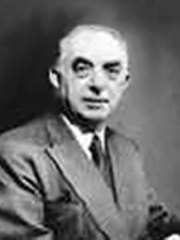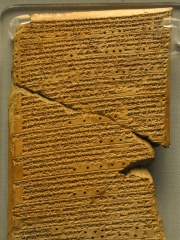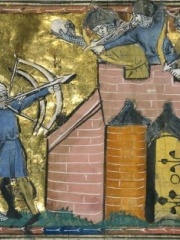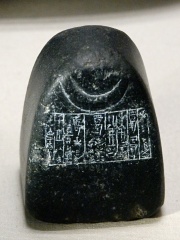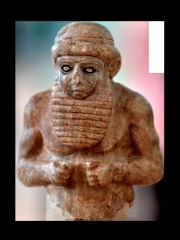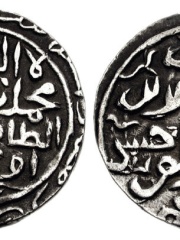Politician
Ziusudra
EN.WIKIPEDIA PAGE VIEWS (PV)
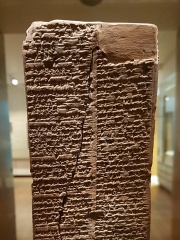
 Ziusudra
Ziusudra
Ziusudra (Old Babylonian Akkadian: 𒍣𒌓𒋤𒁺, romanized: Ṣíusudrá [ṣi₂-u₄-sud-ra₂], Neo-Assyrian Akkadian: 𒍣𒋤𒁕, romanized: Ṣísudda, Ancient Greek: Ξίσουθρος, romanized: Xísouthros) of Shuruppak is listed in the WB-62 Sumerian King List recension as the last king of Sumer prior to the Great Flood. He is subsequently recorded as the hero of the Eridu Genesis and appears in the writings of Berossus as Xisuthros. Ziusudra is one of several mythic characters who are protagonists of Near Eastern flood myths, including Atrahasis, Utnapishtim, and the biblical Noah. Although each story displays its own distinctive features, many key story elements are common to two, three, or all four versions. Read more on Wikipedia
His biography is available in 31 different languages on Wikipedia (up from 29 in 2024). Ziusudra is the 4,824th most popular politician (down from 4,616th in 2024), the 124th most popular biography from Iraq (down from 120th in 2019) and the 78th most popular Iraqi Politician.
Memorability Metrics
Page views of Ziusudra by language
Among Politicians
Among politicians, Ziusudra ranks 4,825 out of 19,576. Before him are Al-Afdal Shahanshah, Choudhry Rahmat Ali, Ernest I, Duke of Saxe-Gotha, Otto Georg Thierack, Achila II, Margot Honecker, and Otto, Duke of Austria. After him are Hetepheres II, Álvaro Colom, Franz Mehring, Xin Zhui, and François d'Orléans, Prince of Joinville.
Most Popular Politicians in Wikipedia
Go to all RankingsAl-Afdal Shahanshah
1066 - 1121
HPI: 66.79
Rank: 4,820
Choudhry Rahmat Ali
1895 - 1951
HPI: 66.79
Rank: 4,821
Ernest I, Duke of Saxe-Gotha
1601 - 1675
HPI: 66.79
Rank: 4,822
Otto Georg Thierack
1889 - 1946
HPI: 66.78
Rank: 4,823
Achila II
695 - 716
HPI: 66.78
Rank: 4,824
Margot Honecker
1927 - 2016
HPI: 66.78
Rank: 4,825
Otto, Duke of Austria
1301 - 1339
HPI: 66.78
Rank: 4,826
Ziusudra
HPI: 66.78
Rank: 4,827
Hetepheres II
2600 BC - 2560 BC
HPI: 66.78
Rank: 4,828
Álvaro Colom
1951 - 2023
HPI: 66.78
Rank: 4,829
Franz Mehring
1846 - 1919
HPI: 66.78
Rank: 4,830
Xin Zhui
215 BC - 163 BC
HPI: 66.77
Rank: 4,831
François d'Orléans, Prince of Joinville
1818 - 1900
HPI: 66.77
Rank: 4,832
In Iraq
Among people born in Iraq, Ziusudra ranks 124 out of NaN. Before him are Tukulti-Ninurta I (-1300), Ubayd Allah ibn Ziyad (648), Al-Mustansir (1192), Etana (-2850), Al-Qa'im (1001), and Labashi-Marduk (-550). After him are Karim Findi (1946), Nuri al-Said (1888), Ammi-Saduqa (-1700), Kerbogha (1100), Abi-Eshuh (-1800), and Shulgi (-2200).
Others born in Iraq
Go to all RankingsTukulti-Ninurta I
POLITICIAN
1300 BC - 1300 BC
HPI: 66.97
Rank: 118
Ubayd Allah ibn Ziyad
MILITARY PERSONNEL
648 - 685
HPI: 66.97
Rank: 119
Al-Mustansir
POLITICIAN
1192 - 1242
HPI: 66.86
Rank: 120
Etana
POLITICIAN
2850 BC - 2900 BC
HPI: 66.82
Rank: 121
Al-Qa'im
POLITICIAN
1001 - 1075
HPI: 66.81
Rank: 122
Labashi-Marduk
POLITICIAN
550 BC - 556 BC
HPI: 66.80
Rank: 123
Ziusudra
POLITICIAN
HPI: 66.78
Rank: 124
Karim Findi
WRITER
1946 - Present
HPI: 66.74
Rank: 125
Nuri al-Said
POLITICIAN
1888 - 1958
HPI: 66.72
Rank: 126
Ammi-Saduqa
POLITICIAN
1700 BC - 1700 BC
HPI: 66.72
Rank: 127
Kerbogha
POLITICIAN
1100 - 1102
HPI: 66.71
Rank: 128
Abi-Eshuh
POLITICIAN
1800 BC - 1700 BC
HPI: 66.68
Rank: 129
Shulgi
POLITICIAN
2200 BC - 2046 BC
HPI: 66.62
Rank: 130
Among Politicians In Iraq
Among politicians born in Iraq, Ziusudra ranks 78. Before him are Enmerkar (-2500), Tukulti-Ninurta I (-1300), Al-Mustansir (1192), Etana (-2850), Al-Qa'im (1001), and Labashi-Marduk (-550). After him are Nuri al-Said (1888), Ammi-Saduqa (-1700), Kerbogha (1100), Abi-Eshuh (-1800), Shulgi (-2200), and Az-Zahir (1176).
Enmerkar
2500 BC - 3000 BC
HPI: 67.19
Rank: 72
Tukulti-Ninurta I
1300 BC - 1300 BC
HPI: 66.97
Rank: 73
Al-Mustansir
1192 - 1242
HPI: 66.86
Rank: 74
Etana
2850 BC - 2900 BC
HPI: 66.82
Rank: 75
Al-Qa'im
1001 - 1075
HPI: 66.81
Rank: 76
Labashi-Marduk
550 BC - 556 BC
HPI: 66.80
Rank: 77
Ziusudra
HPI: 66.78
Rank: 78
Nuri al-Said
1888 - 1958
HPI: 66.72
Rank: 79
Ammi-Saduqa
1700 BC - 1700 BC
HPI: 66.72
Rank: 80
Kerbogha
1100 - 1102
HPI: 66.71
Rank: 81
Abi-Eshuh
1800 BC - 1700 BC
HPI: 66.68
Rank: 82
Shulgi
2200 BC - 2046 BC
HPI: 66.62
Rank: 83
Az-Zahir
1176 - 1226
HPI: 66.53
Rank: 84
